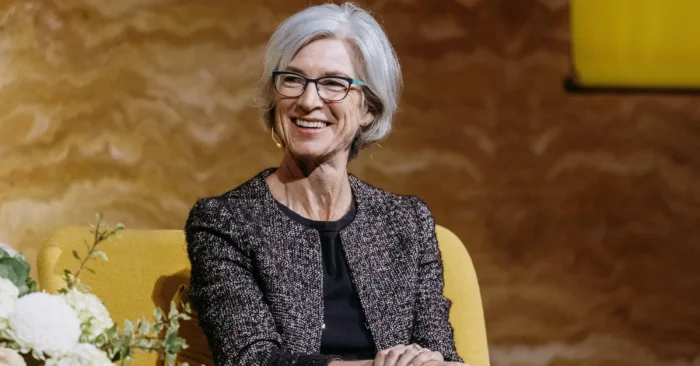Jennifer Doudna – Biography
Early Life and Education
Jennifer Anne Doudna was born on February 19, 1964, in Washington, D.C., and raised in Hilo, Hawaii. Her father, a literature professor, and her mother, a school administrator, encouraged intellectual curiosity from a young age. Surrounded by Hawaii’s natural beauty, Doudna developed a deep interest in science, especially chemistry and biology. She attended Hilo High School, where her passion for the natural sciences flourished. After high school, she enrolled at Pomona College but later transferred to Pomona’s sister institution, Pomona College in California, where she earned her bachelor’s degree in biochemistry in 1985. She then pursued graduate studies at Harvard Medical School, earning her Ph.D. in biological chemistry and molecular pharmacology in 1989.
Academic and Research Career
Following her Ph.D., Doudna completed postdoctoral research at the University of Colorado, Boulder, under the mentorship of Thomas Cech, a Nobel Prize-winning chemist known for his work on RNA. During this period, she became deeply involved in the study of RNA structures and their catalytic functions. In 1994, she joined Yale University as a faculty member, where her lab made groundbreaking discoveries in RNA crystallography. These early contributions earned her a place in the growing field of molecular biology. In 2002, Doudna returned to California to join the University of California, Berkeley, where she took a position as a professor of chemistry and molecular and cell biology. Her research at Berkeley further advanced the understanding of RNA and laid the groundwork for the revolutionary CRISPR gene-editing technology.
Breakthrough with CRISPR
Jennifer Doudna’s most significant scientific contribution came through her work on CRISPR-Cas9, a gene-editing tool that allows scientists to make precise changes to DNA. In collaboration with Emmanuelle Charpentier in 2012, Doudna published a landmark paper demonstrating how CRISPR-Cas9 could be programmed to target specific genetic sequences. This discovery transformed genetic research and opened new possibilities for treating genetic diseases. The CRISPR technology enables scientists to cut and edit DNA at desired locations, offering potential cures for hereditary conditions, improved agricultural practices, and innovations in biotechnology. Their work has been hailed as one of the most important scientific breakthroughs of the 21st century.
Awards and Recognition
Jennifer Doudna has received numerous accolades for her groundbreaking work. In 2020, she was awarded the Nobel Prize in Chemistry alongside Emmanuelle Charpentier, making them the first two women to share this prize without male collaborators. This achievement not only recognized their scientific innovation but also highlighted the increasing role of women in STEM fields. Doudna has also received the Breakthrough Prize in Life Sciences, the Kavli Prize in Nanoscience, and the Wolf Prize in Medicine. In addition to these honors, she was elected to prestigious institutions such as the National Academy of Sciences and the American Academy of Arts and Sciences.
Ethical Leadership and Advocacy
Beyond her scientific work, Doudna has taken an active role in guiding ethical conversations surrounding gene editing. She has spoken extensively about the need to establish global standards and ethical frameworks for the use of CRISPR, especially in human embryos. Doudna convened international summits to promote responsible scientific practices and prevent misuse of gene-editing technologies. Her book, “A Crack in Creation,” co-authored with Samuel Sternberg, discusses the science of CRISPR and its ethical challenges, helping to make the topic accessible to a broader audience. Doudna continues to advocate for transparency and international cooperation in gene-editing research.
Personal Life and Influence
Jennifer Doudna is married to Jamie Cate, a fellow professor at UC Berkeley, and they have one son. Despite her intense research schedule, Doudna balances her family life and remains passionate about mentoring young scientists. She often emphasizes the importance of resilience, curiosity, and integrity in scientific research. Doudna’s influence extends beyond the lab. She has become a global voice for science education, ethics in biotechnology, and the importance of public engagement in scientific advancements. Her leadership in both research and policy demonstrates her commitment to shaping a responsible and inclusive future for genetic technologies.
Legacy and Ongoing Work
Jennifer Doudna’s legacy is deeply tied to the future of genetics. She co-founded several biotech companies, including Caribou Biosciences and Mammoth Biosciences, which focus on applying CRISPR technology in healthcare and diagnostics. At UC Berkeley, she continues to lead the Innovative Genomics Institute, where research is aimed at advancing gene therapy and agricultural innovation. Her work has already transformed how scientists think about curing diseases and editing life itself. As CRISPR evolves, Doudna remains at the forefront, balancing innovation with caution and responsibility.
Frequently Asked Questions
What is Jennifer Doudna known for?
Jennifer Doudna is best known for co-inventing CRISPR-Cas9, a gene-editing technology that allows precise modification of DNA.
When did Jennifer Doudna win the Nobel Prize?
She was awarded the Nobel Prize in Chemistry in 2020 alongside Emmanuelle Charpentier for their work on CRISPR-Cas9.
What is CRISPR-Cas9?
CRISPR-Cas9 is a revolutionary gene-editing tool that enables scientists to modify DNA sequences with high precision and efficiency.
What is Jennifer Doudna’s role in bioethics?
Doudna advocates for ethical standards in gene editing and has organized international discussions on responsible use of CRISPR technology.
Has Jennifer Doudna written any books?
Yes, she co-authored “A Crack in Creation,” a book that explores the science and ethical implications of CRISPR.






